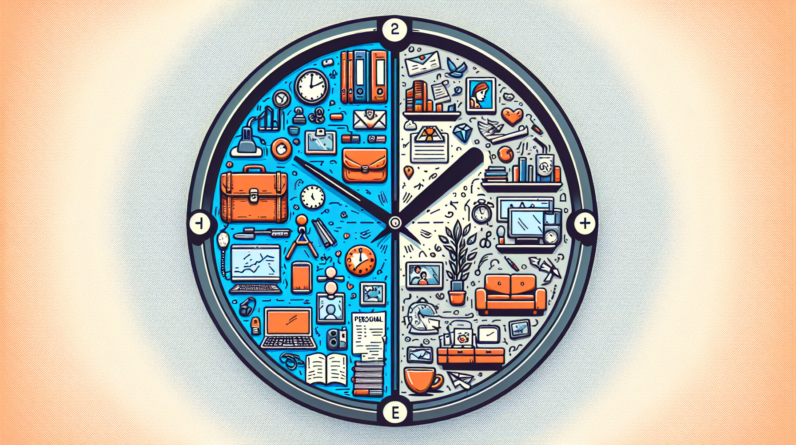
Are you constantly feeling overwhelmed by the demands of work and life? It’s no secret that achieving a healthy balance between the two can be a challenge, but fear not – there is a solution. In this article, we will explore the mindful approach to achieving work-life balance and how it can transform your life. By incorporating mindfulness practices into your daily routine, you will discover a newfound sense of peace, productivity, and overall well-being. Say goodbye to stress and hello to a more harmonious lifestyle. It’s time to take control and create the balance you deserve.

The Importance of Work-Life Balance
Understanding the concept of work-life balance
Work-life balance refers to the equilibrium between the demands of work and personal life. It involves managing and organizing your time, energy, and resources in a way that allows you to fulfill responsibilities at work while also enjoying a fulfilling personal life. By achieving a healthy work-life balance, you are able to avoid burnout, reduce stress, improve overall well-being, and foster meaningful connections with loved ones.
The impact of an imbalanced lifestyle
Living an imbalanced lifestyle, where work takes precedence over personal life or vice versa, can have serious consequences on various aspects of our lives. When work overwhelms our personal life, it can lead to increased stress levels, strained relationships, and a diminished sense of fulfillment and happiness. On the other hand, neglecting work responsibilities can result in professional setbacks, low productivity, and financial difficulties. Striking a balance is crucial for our physical and mental well-being, as well as our overall success and happiness.
Benefits of achieving work-life balance
When you achieve work-life balance, you experience a multitude of benefits that improve both your personal and professional life. First and foremost, it reduces stress and promotes better mental health, allowing you to feel more content and fulfilled. Achieving this balance also enhances your productivity and performance at work, as you are able to bring your best self to the table without feeling overwhelmed or burnt out. Furthermore, a balanced lifestyle fosters stronger relationships with loved ones, as you have the time and energy to connect and engage with them. Overall, work-life balance promotes a healthier and happier life, allowing you to lead a more fulfilling and successful life.
Mindfulness as a Tool for Work-Life Balance
What is mindfulness?
Mindfulness is the practice of intentionally paying attention to the present moment, without judgment. It involves fully engaging in whatever you are doing, whether it is a work task or enjoying leisure time, and being aware of your thoughts, emotions, and physical sensations. By cultivating mindfulness, you can become more attuned to your needs, avoid unnecessary stress, and make conscious choices that contribute to a balanced and fulfilling life.
How mindfulness can help achieve work-life balance
Mindfulness is a powerful tool that can help you achieve work-life balance by cultivating self-awareness and reducing stress. When you are mindful, you are better able to recognize when work is encroaching on your personal life or when you are neglecting work responsibilities at the expense of your well-being. By paying attention to your thoughts and feelings, you can make conscious decisions that prioritize your needs and strike a balance between work and personal life. Mindfulness also helps you manage stress more effectively, as you develop the ability to stay present, stay calm, and respond skillfully to any challenges that arise. By integrating mindfulness into your daily life, you can approach work and personal life with greater clarity, focus, and balance.
Developing a Mindful Mindset
Recognizing and challenging societal expectations
Societal expectations often glorify the idea of constant busyness and prioritize career success above all else. However, to achieve work-life balance, it’s important to recognize and challenge these expectations. By questioning the societal norms and reevaluating what truly matters to you, you can create a mindset that values personal well-being, meaningful connections, and a balanced life. This shift in mindset allows you to prioritize your needs and make choices that align with your own values and priorities.
Understanding personal values and priorities
To develop a mindful mindset, it is essential to understand and define your personal values and priorities. What brings you joy and fulfillment? What are the aspects of life that you hold dear? Taking the time to reflect on these questions will provide clarity and guide your decision-making process. By aligning your daily actions with your values and priorities, you can create a sense of purpose and balance in your life. Understanding what truly matters to you will help you make intentional choices and cultivate a mindful mindset that supports work-life balance.
Setting Boundaries and Priorities
Creating clear boundaries between work and personal life
Establishing clear boundaries between work and personal life is crucial for maintaining work-life balance. This means setting specific times when you are fully committed to work and other times when you focus on personal activities and relationships. Create a distinction between your work space and personal space, set designated work hours, and communicate these boundaries with colleagues and loved ones. By delineating separate spheres, you can ensure that work demands do not spill over into your personal life, and vice versa.
Identifying and prioritizing important aspects of life
To achieve work-life balance, it is important to identify and prioritize the different aspects of life that hold significance to you. This includes your health, relationships, hobbies, and personal goals. Take time to reflect on what truly matters and make a list of the areas that you want to prioritize. By consciously allocating time and energy to these aspects, you ensure that they are not neglected. Prioritizing what is truly important to you allows you to maintain a sense of balance and fulfillment in your life.

Effective Time Management
Identifying time wasters and distractions
Effective time management is essential for achieving work-life balance. Start by identifying common time wasters and distractions that prevent you from being productive and present. This may include excessive time spent on social media, unnecessary meetings, or indulging in tasks that could be delegated. By recognizing these time wasters, you can make conscious efforts to minimize them and reclaim precious time that can be dedicated to both work and personal life.
Implementing time management techniques
Implementing time management techniques can help you make the most of your time and create a sense of balance in your life. This may include prioritizing tasks, breaking them down into smaller, manageable parts, and using tools such as calendars or task management apps. Set realistic goals and deadlines, and practice effective delegation when necessary. By managing your time effectively, you can reduce stress, increase productivity, and create space for both work and personal life.
Creating Healthy Habits
The importance of self-care
Self-care is crucial for maintaining work-life balance and overall well-being. It involves prioritizing your physical, mental, and emotional needs and engaging in activities that recharge and rejuvenate you. This can be as simple as taking breaks throughout the day, practicing mindfulness or relaxation techniques, or engaging in hobbies that bring you joy. By incorporating self-care into your daily routine, you can replenish your energy, reduce stress, and enhance your ability to manage both work and personal life effectively.
Incorporating exercise and physical activity
Regular exercise and physical activity have numerous benefits for both your physical and mental health. Engaging in exercise not only boosts your energy levels and enhances your overall well-being but also helps reduce stress and improve concentration. Finding activities that you enjoy, such as walking, yoga, or dancing, can make exercise a fun and sustainable part of your routine. By incorporating physical activity into your life, you not only prioritize your health but also create balance by dedicating time to your personal well-being.
Establishing healthy sleep patterns
Sleep plays a vital role in maintaining overall health and work-life balance. Establishing healthy sleep patterns ensures you are well-rested and ready to tackle the demands of both work and personal life. Aim for a consistent sleep schedule, create a restful sleep environment, and practice relaxation techniques before bedtime to promote quality sleep. By prioritizing sleep, you enhance your ability to focus, make better decisions, and manage stress effectively, leading to a more balanced and fulfilling life.

Nurturing Relationships
Balancing personal and professional relationships
Maintaining a balance between personal and professional relationships is essential for work-life balance. It is important to allocate time and energy to nurture and cultivate meaningful connections with both loved ones and colleagues. Be present and engaged when spending time with family and friends, and also recognize the value of building positive relationships at work. By striking a balance between these relationships, you foster a sense of fulfillment and support in both realms of your life.
Effectively communicating needs and expectations
Open communication is key to nurturing relationships and achieving work-life balance. Clearly communicate your needs and expectations to both personal and professional contacts, ensuring that everyone is aware of your boundaries and priorities. Expressing your needs and expectations allows for better understanding, reduces misunderstandings, and helps maintain balance in your various relationships. By effectively communicating, you can foster supportive connections and create a harmonious environment in both personal and professional spheres.
Embracing Imperfection
Letting go of perfectionism
Perfectionism is a mindset that can hinder work-life balance. It often leads to excessive self-imposed pressure, stress, and dissatisfaction. Instead, embrace imperfection and recognize that striving for progress, rather than perfection, is more important. Allow yourself to make mistakes, learn from them, and focus on the positives rather than dwelling on perceived failures. By letting go of perfectionism, you create space for balance, growth, and self-compassion.
Accepting and embracing the concept of ‘good enough’
In a world that often pushes us to strive for more, it is important to accept and embrace the concept of ‘good enough.’ Acknowledge that there will always be limitations and that you cannot always achieve everything at the highest level. Set realistic expectations for yourself and strive for a level of accomplishment that feels balanced and fulfilling. By accepting and embracing ‘good enough,’ you release unnecessary stress and create a mindset that supports work-life balance.
The Role of Flexibility
Adapting to change and unexpected events
Flexibility is crucial for achieving work-life balance, as it allows you to adapt to change and unexpected events. Recognize that life is full of unpredictable circumstances, and being open to change helps you navigate them effectively. Whether it is a sudden work deadline or a personal commitment, embrace the need for flexibility and adjust your plans accordingly. By remaining flexible, you can find creative solutions, minimize stress, and maintain a sense of balance in the face of uncertainty.
Embracing flexibility in work and personal life
To achieve work-life balance, it is important to embrace flexibility in both work and personal life. This may involve negotiating for flexible work hours or alternative work arrangements that allow you to balance professional demands with personal responsibilities. On a personal level, being flexible means being open to adjusting plans and priorities to accommodate the changing needs of yourself and others. By embracing flexibility, you create an environment that supports work-life balance and allows for a harmonious integration of work and personal life.
Seeking Support and Resources
Utilizing available support systems
Seeking support from others is essential for achieving work-life balance. Whether it is reaching out to family, friends, or colleagues, or seeking professional assistance, relying on support systems can help alleviate stress and provide guidance. Connect with those who understand and respect the challenges you face and can offer advice or lend a helping hand when needed. By utilizing available support systems, you can navigate the complexities of work-life balance more effectively and find the necessary support to maintain equilibrium.
Engaging in professional development and education
Continuously engaging in professional development and education is key to achieving work-life balance. Stay up-to-date with industry trends and advancements, and seek opportunities for personal growth and skill development. By investing in your professional development, you enhance your ability to perform tasks efficiently and effectively, reducing the likelihood of work encroaching on personal life. Furthermore, ongoing education helps you stay motivated, engaged, and fulfilled in both your work and personal pursuits.
In conclusion, achieving work-life balance is crucial for our overall well-being and success. By understanding the concept of work-life balance, embracing mindfulness, developing a mindful mindset, setting boundaries and priorities, practicing effective time management, creating healthy habits, nurturing relationships, embracing imperfection, embracing flexibility, and seeking support and resources, you can strive for a more balanced and fulfilling life. By prioritizing your well-being, relationships, and personal values, you can bring harmony to both your work and personal life, ultimately leading to a more meaningful and enjoyable life journey.





